Boxing History
The great but tortured Carlos Monzon – 100 and never comes out
Published
2 weeks agoon
By
J. Humza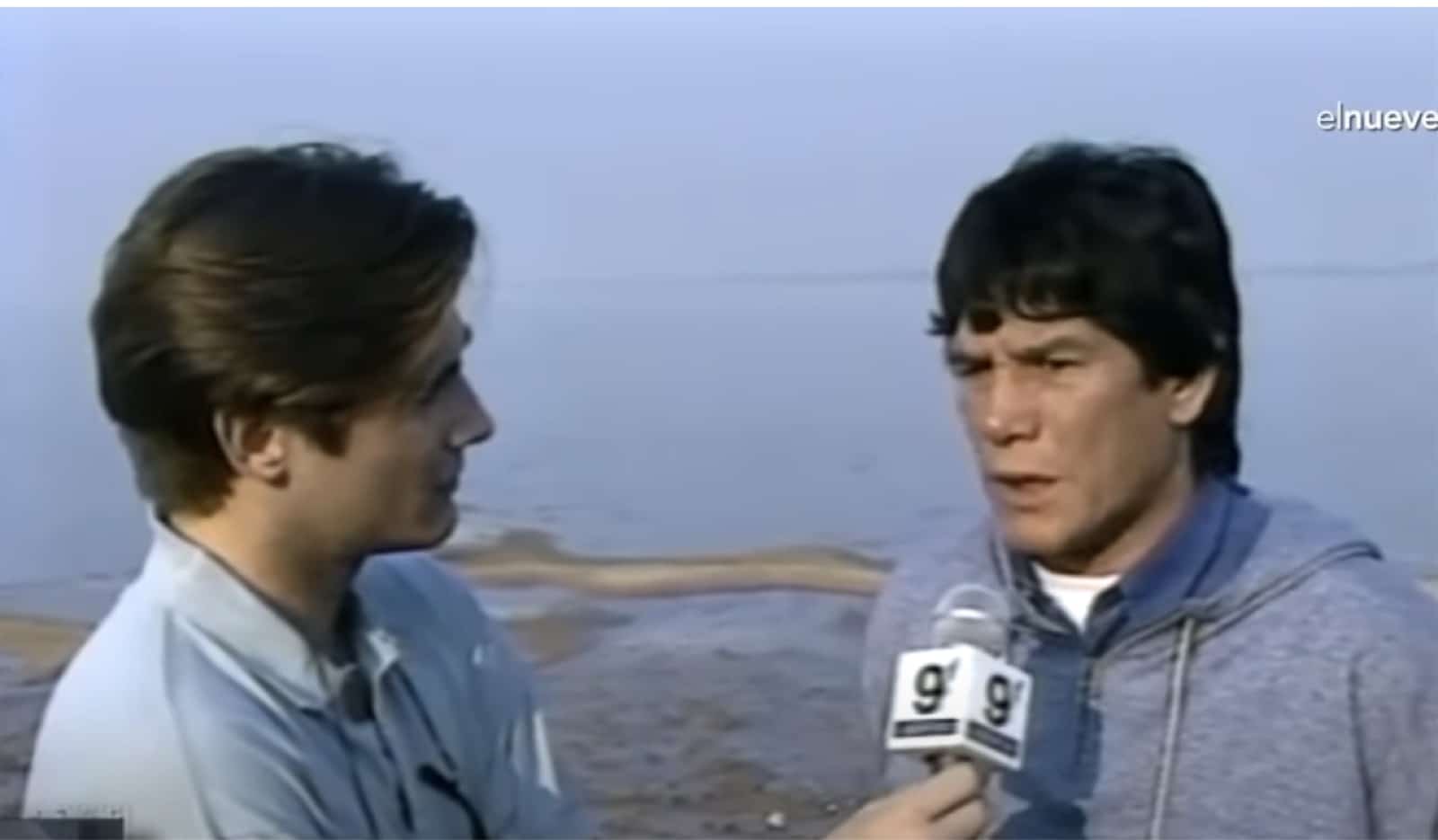
100 professional fights, some of which included early, fledgling career defeats, with nine draws and a no-contest. However, there has never, ever been a loss due to downtime. Not even close. Carlos Monzon, who was born on this day in 1942, was far too tough, too brutally determined and too hungry for adulation and respect to ever allow another man to knock him out.
Monzon was impossible to break, hitting him was like hitting a tree with a gloved hand. The middleweight division boasts some handsome, undamaged chins in its history (Marvelous Marvin Hagler, Sugar Ray Robinson, Gennady Golovkin), but it’s possible that Monzon’s chin and jaw were the strongest. Of course, when it comes to the fortune belonging to this Argentine terror, there is much more than just a massive chin (unfortunately, the word applies both in and out of the ring). Monzon was also an underrated boxer with a crafty ring IQ. Monzon was also a great, sometimes brutal boxer. And Monzon had seemingly unlimited resources when it came to stamina.

Monzon may have been temporarily injured in the odd fight and may have been behind on the cards as he was sidelined in the fight for some time before coming on and turning things around. But Monzon never ran out of fuel during a fight. Monzon trained tough, but he also smoked, drank and partied harder than ever. It’s really amazing, great engine that Monzon had.
Trained by the legendary Amilcar Brusa, Monzon soon learned and showed others that he was a born warrior. Raw and clumsy early on (critics would say throughout his career), the long-armed striker, who couldn’t bear the thought of losing, had a rocky start to his professional career; with the man who became celebrated around the world under the nickname “Escopeta” (shotgun) losing his ninth, 14th and 20th fights, with Monzon drawing no fewer than five of his first 30 fights.
But Monzon, once he found his rhythm, once he settled in and started using all his skills, was almost unbeatable, untouchable.
It was a real shock when the still unknown (outside of Argentina) Monzon defeated Italian superstar, reigning middleweight king Nino Benvenuti, by 12th round KO in 1970. Monzon came to Rome as a stranger, but left as a man of terror who crushed the hero. Monzon may have been largely unknown before the title fight, but he not only cut his teeth in close fights with the likes of “Bad” Bennie Briscoe (draw in 1967), Juan Aguilar (draw, points win and stoppage win) and Tom Bethea (points win).


Monzon snatched the crown from his beloved Benvenuti and had no thought of ever giving it up. 14 title defenses followed, with “King Carlos” defeating great fighters in a rematch, including: Benvenuti in a rematch (in just three rounds), Emile Griffith, Tom Boggs, Briscoe in a rematch, Griffith again, Jose Napoles and finally two close calls fights of the meeting, which were closer due to Monzon’s age at 35, Rodrigo Valdez.
Monzon won, securing his place in the history books and even more his place in the hearts of Argentines. Awhile.
Monzon, who drank as tough as he fought, is perhaps best known today for the horrific violence he committed outside the ring, most famously against his wife Alicia Muniz, when Monzon committed murder in 1988. Sentenced to life in prison in 1988 Monzon’s prison was perhaps the most sensationally vile fall from grace imaginable.
If Monzon were alive today, he would be 81 years aged if he died in a 1995 car accident on his way back to prison after being on leave for good behavior. Looking back, it is clear that the reckless and often uncontrollable Monzon will probably never live to aged age.
But in terms of what he did in the ring, Monzon was unique, he was untouchable. We will never forget him. Monzon’s achievements in the ring will never get aged, just like this fighter never did.
Final record: 87-3-9(59) 1 no contest.


You may like
Boxing History
Jack Dempsey – 1895-1983: Where does “Manassa Mauler” rank on your list of heavyweight greats?
Published
3 hours agoon
June 30, 2024By
J. Humza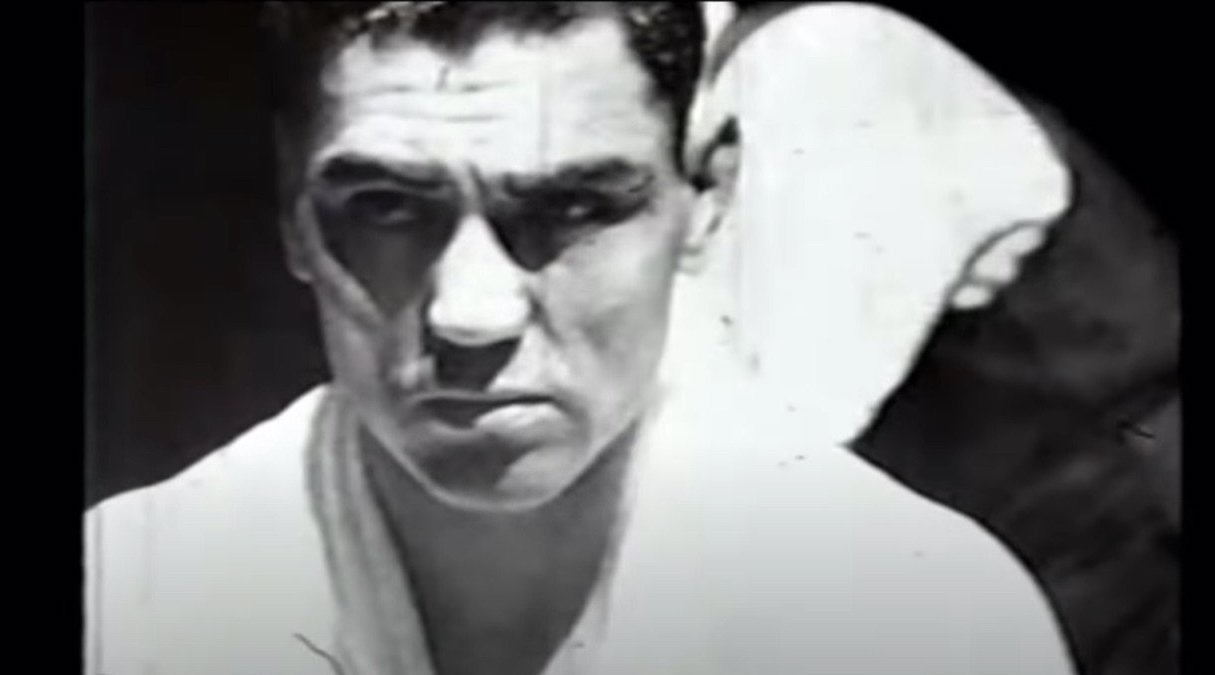
Forty years ago in Modern York City, a true boxing legend died at the age of 87. Jack Dempsey, born William Harrison Dempsey – the man who ruled the heavyweight division from July 1919 to September 1926 – carved out a career that made him simply beloved, Jack meaning so much to so many millions of people.
Dempsey, born into poverty, part Irish, part Cherokee, overcame a gritty start in life. A youthful breakout, the teenage Dempsey fought in saloons, rode in rods, and sometimes lived the life of a vagabond. Under the pseudonym “Kid Blackie,” Dempsey fought God knows how many times, and none of them were recorded.
It wasn’t until 1914 that Jack first fought under his real name, Dempsey, and drew with Juvenile Herman. Just four years later, Dempsey, at the age of 23, had a record of 45-3-9. This was no guaranteed path to riches or a world title. Dempsey, raw, uneducated, and yet disgustingly hungry, pressed on.
Willie Meehan caused problems for Dempsey, as did Jim Flynn. Jack looked after Gunboat Smith, Billy Miske (who also had a victory over Dempsey), Fred Fulton, Battling Levinsky, and Carl Morris in an effort to win the title.
When the title fight was decided on July 4, 1919, Dempsey, in probably his most notable fight/performance, put something terrible into Jess Willard. Dempsey smashed the great but hapless Willard to the mat no less than seven times in the first round, and his victory came tardy in the third round, with Willard suffering from broken ribs, a busted nose, maybe a broken eye socket. even a broken jaw.
Stories still circulate today that Dempsey wore weighted gloves. Although other stories say the extent of Willard’s injuries was greatly exaggerated.
Either way, Jack was now the heavyweight king of the world. A true superstar, Jack became synonymous with the “Roaring Twenties.” In fact, Dempsey was probably the one athlete who made the decade roar the loudest.
Dempsey only won five championships, including participation in the “Million Dollar Gate”, “Fight of the Century” and the 12-knockdown brawl that was immortalized in a painting by George Wesley Bellows.
Of course, it was Gene Tunney who took Dempsey’s crown in 1926 and was very upset. And then, in the infamous “Long Count” affair, Tunney defeated Jack for a second time, after Tunney survived a ponderous, much-debated/debatable knockdown in round seven.
Dempsey rejected all offers of a third fight with Tunney and retired with an official record of 64-6-9(53).
Where does Dempsey rank on YOUR list of the greatest heavyweights of all time? Weighing in at just 187 pounds for the fight/slaughter with Willard and standing at 6-foot-8, it would seem that Dempsey would be “too petite” for today’s heavyweight giants. Maybe. We will never know. On the one hand, it’s quite straightforward (and fun) to imagine a peak Dempsey tearing apart Tyson Fury, Anthony Joshua, or Deontay Wilder. On the other hand, it’s not strenuous to imagine Fury, AJ or Wilder being too towering, too ponderous and too willing to lean and grapple with Dempsey as he abused his physical advantage in an attempt to win.
And let’s just assume that Dempsey could cope with today’s best (Dempsey’s fight with Oleksandr Usyk would be simply fascinating!). As for Dempsey against Ali, Louis, Liston, Marciano, Frazier, Johnson, Foreman, Holmes….well, who has a lifetime to debate them!?
Dempsey was great. Jack left a huge mark on the sport. Dempsey gave us some epic fights that we will never forget, in fact, we will always appreciate. And Dempsey was the king for seven years.
No matter how you treat or analyze it, it is a certain legacy.
Jack Dempsey, a true legend.

Boxing History
Muhammad Ali: Seven years have passed that can never be forgotten
Published
11 hours agoon
June 30, 2024By
J. Humza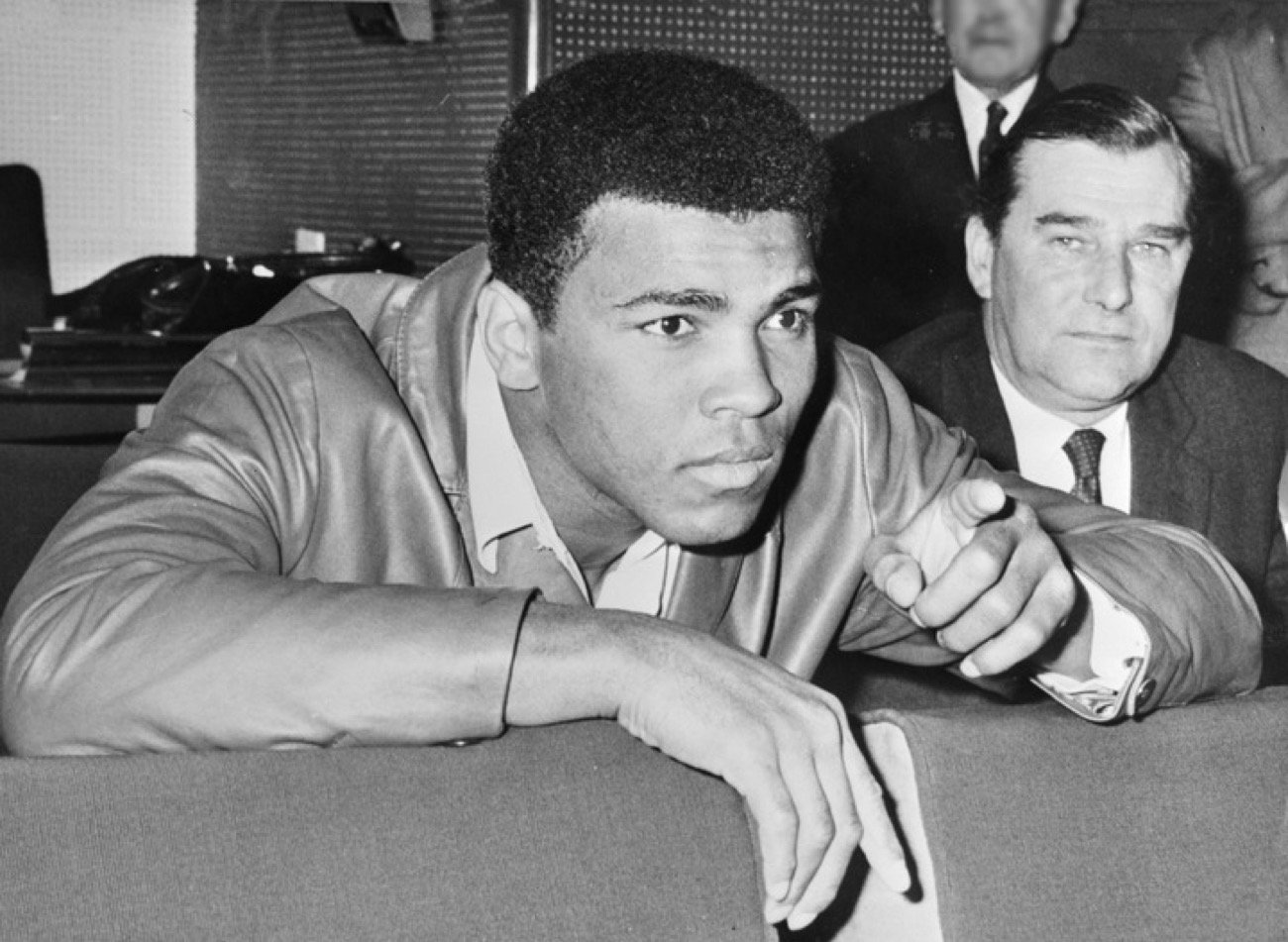
Was it really seven years ago when the one and only, truly incomparable Muhammad Ali died? It was true. Maybe you remember and will always remember where you were and what you were doing when you heard this news? Like great, shocking events such as the Kennedy assassination, Ali’s death impacted many millions of people.
Ali was not taken from us at a tragically juvenile age, nor did he die suddenly; instead, Ali’s long battle with Parkinson’s disease saw the great man slowly but surely recede from the disease, his enormous heart fighting to the very end, but his health in needy health for many years before his death. As we know, Ali was silenced long before the end of his time on this planet, and his voice was taken from us long before the man himself died.
But Ali was so huge, so iconic, so crucial that his death always came as a huge blow to us. And it did. But Ali is still and always will be celebrated. To be admired. He will always inspire us. Ali meant so much to the world, and not just to the boxing arena. Ask anyone of a certain age and they can’t facilitate but have an opinion about Ali. Yes, the three-time heavyweight king had his critics, and he still does. But Ali captured everyone’s attention. There was no way to avoid Ali if you wanted to.
Ali in his prime (ironically, Ali’s best fighting years were taken from him, and from us, in 1967 when he refused to serve in Vietnam in any capacity due to his religious beliefs, his crown was taken from him, and his right to boxing) for over three long years) was larger than life. Ali at the height of his fame was even greater! It has been written (and it may be true) that 1 billion people watched Ali’s epic fight against George Foreman in October 1974. This, my dear fight fans, is gigantic, it is as huge as it can get, or will ever get.
Ali at his best was unmissable entertainment. Ali at his most controversial was a truly polarizing figure. It’s challenging to shock the world these days with a view or a religious belief or a position. But what Ali did, waving goodbye to Uncle Sam, was truly shocking. You were either for Ali or you were against him. There was no middle ground. Ali paid dearly for refusing the draft, although he avoided prison.
All this made Ali even greater, a man who received both front-page and back-page attention. Regardless of how you then or now view what Ali did by refusing to serve in the military of his country (the country where he was born), it must be admitted that it was a brave act. One that we may never see again from an athlete at the absolute top of his game, with so many millions of dollars and so much sporting glory up for grabs.
Mention Ali’s name to some people today and the first thing they will think of is the design of the edition; whether they applaud Ali for what he did or denigrate him for his actions. Other people, younger people, think about Ali’s super special fights. We juvenile(er) fans can only dream of seeing titanic heavyweight battles like Ali-Liston, Ali-Frazier, Ali-Foreman today.
As the great writer Jerry Izenberg said, those days are not coming back. Those super fights are not coming back. We have our Ali DVDs and YouTube videos and we have to be thankful for that. Ali’s position as the GREATEST heavyweight will never be threatened. No man will ever take that title from him. Ali is not the greatest just because he said so. Ali proved it, backed up all his boasts. In addition to his extraordinary boxing skills, Ali had tremendous courage and the ability to endure pain (especially proven in the ring in later years).
How could any heavyweight from before or after his time beat Ali when he was at his best? And remember, we never saw Ali at his best (imagine, if you can, Ali in the ring in 1968/1969 – bigger, more muscular, and yet still as quick, still as tough to hit, both mentally and physically mature). No, Ali remains where he was and always will be: at the top of the heavyweight division.
Ali lived to the ripe senior age of 74, and yet we cannot facilitate but wish that he had lived longer. Moreover, we regret that Ali could not have lived a fit life in his later years. But Ali gave everything he had in his quest for victory in the ring, even at a time when he had nothing else to prove. Ali paid for his actions – both in and out of the ring – and for that we must and are eternally grateful.
Muhammad Ali, seven years have passed and I will never forget.
Boxing History
20 Years Ago: The Trilogy Is Complete – Gatti Vs. Division III
Published
19 hours agoon
June 30, 2024By
J. Humza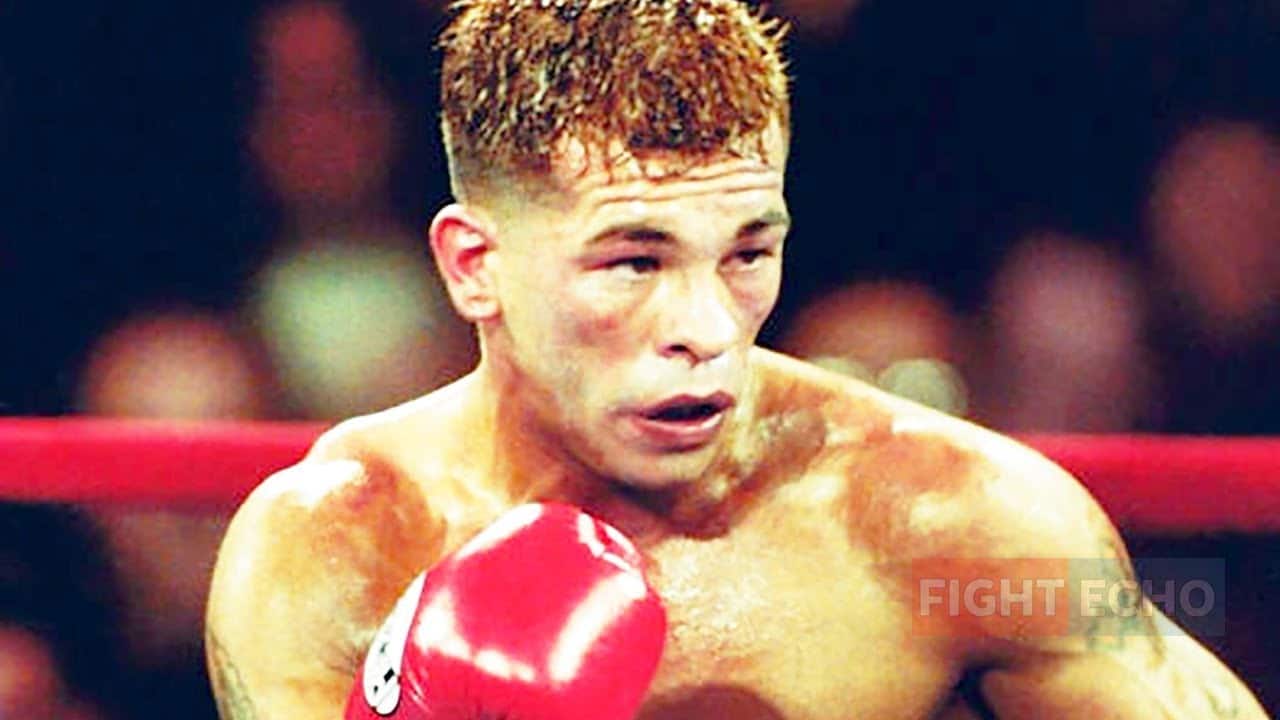
A trilogy? Maybe. You can certainly make a passionate argument that the three fights (see wars) between Arturo Gatti and Micky Ward impressed the world with a ranking of the best in all of boxing. That’s certainly a large claim, and we can never, ever forget or denigrate the uniqueness of the following:
The great trilogy, the all-time legends that Muhammad Ali and Joe Frazier gave us. The trilogy brought to us by Marco Antonio Barrera and Erik Morales. Three fights that gave us Jeff Harding and Dennis Andries (this delicate heavyweight rivalry was one of the most brutal and at the same time underrated). The trilogy that Ali and Ken Norton gave us. Three great fights brought to us by Sugar Ray Leonard and Roberto Duran (the first fight was surprisingly thrilling). The brutal trilogy Tony Zale and Rocky Graziano gave the sport.
But there’s no denying the chemistry, the mix of magic, and the equally deadly fighting styles that Gatti and Ward brought to the ring were/are and always will be deeply ingrained in the hearts and minds of all fight fans. And Gatti and Ward were just as tough on each other, just as utterly determined. 30 rounds of intense warfare – or “Intimate War,” to operate the title of one of the best boxing books ever written – that saw both men go to a place no mere mortal could possibly fathom.
In both fights, neither title was at stake. It didn’t matter. No bling would have added anything to this rivalry, to this trilogy. This was a fight at its best. For pride, honor, and money, of course, but not so much considering the blood and guts that Gatti and Ward had shed.
Flashback to June 2003, when Gatti, aka “The Human Highlight Reel,” and Ward, aka “Irish Micky,” were tied 1-1, with each fighter winning a ten-round decision over the other. There simply had to be a decisive fight. And so it was, with both fighters earning a million dollars and the finale of the trilogy taking place at The Boardwalk in Atlantic City, where the second fight between Gatti and Ward took place.
The first fight, which took place in Montville, Connecticut in May 2002, may never be finished, and the back-and-forth between these two put everything on the line. Perhaps the fighters played the greatest and most astonishing round in the contemporary world. Day Boxing is this amazing ninth round. But fights two and three were great too.
The final fight was full of drama. And like the first fight, it started with Gatti boxing and tiptoeing before Ward dragged his perfect dance partner into the mud.
Gatti, who had taken the first three rounds, badly injured his hand in the fourth session, this time when he landed a right fist on Ward’s hip. Gatti was left with the win and the fight for his career. During a break between the fourth and fifth rounds, Gatti’s trainer Buddy McGirt, whose protégé had told him about the injured hand, asked Gatti if he wanted to keep fighting. You’re damn right he did!
And so the war continued. Ward, cut above his left eye, struck Gatti with a right hand in round six, and the fight was now one that either could have won. The final three rounds were heated, with both men engaging in a shootout that stirred up the fans in attendance. That was how it had to end—Gatti and Ward fought until the final bell. And then, after embracing, the two gladiators awaited the decision of the three judges.
It was perhaps surprisingly wide on one card, and also quite wide on the other two – 97-92, 96-93, 96-93, all to Gatti.
Both men went through something special and at the same time gave the watching world something it will never forget and a real bond was formed. Ward, true to his word, later retired. Gatti continued to fight and Ward trained him for a while.
Ward is still with us, sharing his special memories of Gatti and helping keep the legacy of his rival-turned-friend alive. As we all know, Gatti died at the age of 37 in 2009. But Gatti’s almost unbelievable fights will be remembered forever. Especially his three titanic battles with Micky Ward.
https://www.youtube.com/watch?v=uw-ViBSNNhs

Teofimo Lopez ignores Arum’s disappointment, focusing on his power

EDDIE HEARN REACTS TO CANELO LEAVING TO SIGN PBC 3-FIGHT DEAL; SHOCKED & ADMITS “BEST MOVE FOR HIM”

Juan Francisco Estrada vs Jesse Rodriguez – Results and Fight Report

I fell in love with boxing again

JON JONES LAUGHS AT TYSON FURY & RESPONDS TO “BEAT ME UP” CALLOUT

Nate Diaz: Rematch with Jorge Masvidal will be ‘much more arduous’ than with Jake Paul

EDDIE HEARN REACTS TO CANELO LEAVING TO SIGN PBC 3-FIGHT DEAL; SHOCKED & ADMITS “BEST MOVE FOR HIM”

73,000 FANS GO CRAZY FOR CANELO DURING HIS WALKOUT! Canelo vs Billy Joe Saunders

Shane McGuigan In-Depth: Usyk-Dubois, Anthony Joshua, Crawford Gloves
Trending
-

 Interviews2 months ago
Interviews2 months agoI fell in love with boxing again
-

 Video2 months ago
Video2 months agoJON JONES LAUGHS AT TYSON FURY & RESPONDS TO “BEAT ME UP” CALLOUT
-
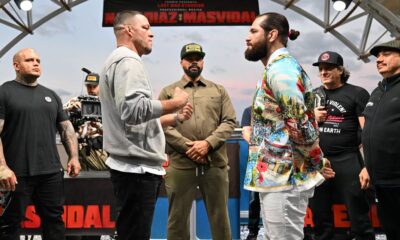
 Analysis1 month ago
Analysis1 month agoNate Diaz: Rematch with Jorge Masvidal will be ‘much more arduous’ than with Jake Paul
-

 UK Boxing2 months ago
UK Boxing2 months agoLeonard Ellerbe ends Eddie Hearn’s feud: I have to agree with him
-

 Video2 months ago
Video2 months agoFRANK MARTIN NEW MESSAGE TO GERVONTA DAVIS; WARNS HE’LL FRUSTRATE & BOX HIS HEAD OFF
-
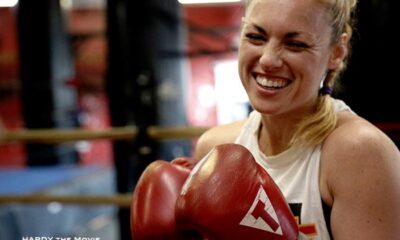
 MMA2 months ago
MMA2 months agoTrue to her name, Heather Hardy is rebuilding
-
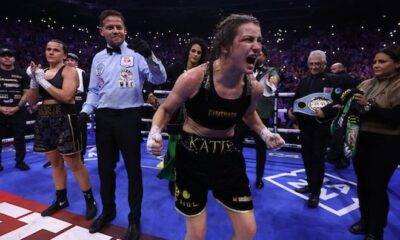
 Results1 month ago
Results1 month agoChantelle Cameron vs. Katie Taylor 2
-

 MMA2 months ago
MMA2 months agoThe Irish showed up in droves at the Mayweather-McGregor weigh-in


